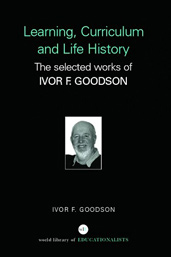Learning, Curriculum and Life Politics: the selected works of Ivor F. Goodson
Towards a Social Constructionist Perspective
The reaction to this pursuit of scientific and universalistic laws came from symbolic inter-actionists, ethno-methodologists and sociologists of knowledge arguing for the rehabilitation of man himself and his subjective perceptions and 'constructions' of reality. Drawing on Weber and Mead we had the work of Schutz, Goffman, and Berger and Luckman. The latter were characteristic in arguing that 'common sense knowledge rather than ideas must be the central focus for the sociology of knowledge. It is precisely this knowledge that constitutes the fabric of meanings without which no society can exist' (Berger and Luckman 1967).
The stress on subjective perceptions in sociology engendered substantial responses in the curriculum field. Here more than ever the ambivalence about theory, the manifest lack of fit with practice caused the pendulum to fly wildly to the other side when the reaction began.
In the United Kingdom the rehabilitation of the practice and process of schooling followed similar lines echoing the new trends in sociology and certain tendencies, not only Schwabian, within American curriculum studies. A wide new range of ethnographic and inter-actionist studies emerged focusing on the process of schooling and most particularly on the classroom. The Manchester School, in particular Hargreaves, Lacey and Lambart, adopted an approach with antecedents in anthropology. The commitment was to trying to understand how teachers and pupils 'constructed' the world of the school. Without detailed study of the school progress was impossible. Their academic leadership often led to a more applied approach in curriculum research and, as curriculum reforms got under way in the wake of comprehensivisation, in curriculum development.
One centre which took a lead in applied work was The Centre for Applied Research in Education (CARE) at the University of East Anglia. CARE was founded in 1970 and embraced commitment to the teacher and his/her perceptions and constructions. The wide range of publications produced allow us to analyse the intentions and positions of those working at CARE. Whilst claims can be made for the uniqueness of CARE there is much that is symptomatic and typical of beliefs at the time. By looking in some detail at CARE it may then be possible to understand some of the reasons for the posture adopted by leading curriculum developers during this period.
